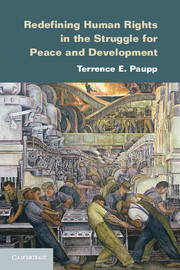Book contents
- Frontmatter
- Dedication
- Contents
- List of Tables
- Foreword
- Acknowledgments
- Introduction
- 1 The greatest undiagnosed problem in international law
- 2 From disparity to centrality: How the human rights to peace and development can be secured
- 3 Confronting structural injustice: Strategies of localization, regionalism, and an emerging global constitutional order
- 4 The power of law versus the law of power: How human rights can overcome inequality, poverty, and vested interests
- 5 A world community that includes all human communities: Indigenous communities and the global environment as sources for human rights claims
- 6 Actualizing the human right to peace: Paths for developing processes and creating conditions for peace
- Conclusion Transformation through cooperation: Implementing a human rights–based approach to human security
- Biography of Terrence E. Paupp
- Appendix 1 Principles Relating to the Status of National Institutions (The Paris Principles)
- Appendix 2 Tilburg Guiding Principles on World Bank, IMF, and Human Rights
- Appendix 3 Universal Declaration of the Rights of Peoples (Algiers, 4 July 1976)
- Appendix 4 The Freedom Charter (Africa, 1955)
- Index
Appendix 3 - Universal Declaration of the Rights of Peoples (Algiers, 4 July 1976)
Published online by Cambridge University Press: 05 June 2014
- Frontmatter
- Dedication
- Contents
- List of Tables
- Foreword
- Acknowledgments
- Introduction
- 1 The greatest undiagnosed problem in international law
- 2 From disparity to centrality: How the human rights to peace and development can be secured
- 3 Confronting structural injustice: Strategies of localization, regionalism, and an emerging global constitutional order
- 4 The power of law versus the law of power: How human rights can overcome inequality, poverty, and vested interests
- 5 A world community that includes all human communities: Indigenous communities and the global environment as sources for human rights claims
- 6 Actualizing the human right to peace: Paths for developing processes and creating conditions for peace
- Conclusion Transformation through cooperation: Implementing a human rights–based approach to human security
- Biography of Terrence E. Paupp
- Appendix 1 Principles Relating to the Status of National Institutions (The Paris Principles)
- Appendix 2 Tilburg Guiding Principles on World Bank, IMF, and Human Rights
- Appendix 3 Universal Declaration of the Rights of Peoples (Algiers, 4 July 1976)
- Appendix 4 The Freedom Charter (Africa, 1955)
- Index
Summary
PREAMBLE
We live in a time of great hope and deep despair;
- a time of conflict and contradictions;
- a time when liberation struggles have succeeded in arousing the peoples of the world against the domestic and international structures of imperialism and in overturning colonial systems;
- a time of struggle and victory in which new ideals of justice among and within nations have been adopted;
- a time when the General Assembly of the United Nations has given increasing expression, from the Universal Declaration of Human Rights to the Charter on the Economic Rights and Duties of States, to the quest for a new international, political and economic order.
But this is also a time of frustration and defeat, as new forms of imperialism evolve to oppress and exploit the peoples of the world.
Imperialism, using vicious methods, with the complicity of governments that it has itself often installed, continues to dominate a part of the world. Through direct or indirect intervention, through multinational enterprises, through manipulation of corrupt local politicians, with the assistance of military regimes based on police repression, torture and physical extermination of opponents, through a set of practices that has become known as neocolonialism, imperialism extends its stranglehold over many peoples.
- Type
- Chapter
- Information
- Publisher: Cambridge University PressPrint publication year: 2014

